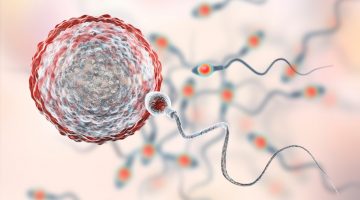Natural IVF: Working with the Body’s Natural Process
Natural cycle in vitro fertilization (natural IVF) is an alternative fertility treatment for couples seeking a more gentle and less invasive approach to conception than conventional IVF.
While conventional IVF uses medications to produce numerous eggs, natural IVF follows a woman’s menstrual cycle and aims to collect the one or two eggs that a woman naturally produces without the use of medication.
This method is appealing to women who prefer to avoid the potential physical and emotional side effects and risks associated with hormonal stimulation. Moreover, natural IVF (along with following ASRM guidelines) can minimize the likelihood of multiples and considerably reduce the cost of IVF.
In this article, we’ll detail the process of natural IVF, along with its benefits and limitations, so you can determine if it’s the right path for you.
How Does Natural Cycle IVF Work?
During a natural IVF cycle, instead of stimulating the ovaries to produce many follicles, a natural cycle forgoes the use of any medications and uses the body’s natural follicular development, which usually produces 1 mature egg.
Monitoring and Maturation of the Egg
Natural IVF begins with the use of ultrasound and blood tests to closely monitor and track the development of the follicles in the ovaries.
Over the course of your natural cycle, specialists typically observe the growth of one leading follicle. When your follicle has reached a mature size, we proceed with an egg retrieval.
Egg Retrieval and Fertilization
Once the egg is mature, it is retrieved through a minor surgical procedure. This procedure is essentially the same as a normal IVF retrieval but with only one or two eggs. It is also important to note that although every egg comes from a follicle, not every follicle will house an egg, leaving the possibility open that no eggs could be retrieved in a natural IVF cycle.
The retrieved egg is then brought to the laboratory where a single sperm is directly injected into the egg to fertilize it in a process called Intracytoplasmic Sperm Injection (ICSI).
Embryo Development and Transfer
Your fertilized egg (embryo) will be monitored for a few days to ensure it reaches the proper stages of development.
The embryo is then transferred to the woman’s uterus with the aim of implantation in the uterine wall, marking the start of pregnancy.
Then, around 9-11 days later (depending on the stage of the embryo), you will schedule a blood test called a beta hCG to check for pregnancy.
What is Modified Natural Cycle IVF?
Modified or Mild Natural Cycle IVF (MNC-IVF) uses medications to stimulate the growth of follicles in the ovaries.
With MNC IVF different protocols start administering FSH at different times in the menstrual cycle. All protocols involve a short stimulation period lasting between two to six days.
When the leading follicle grows to at least 15 to 20 mm, a trigger shot is given to finalize the maturity of the egg. This is similar to the process in Conventional Ovarian Hyperstimulation IVF (COH-IVF), but in MNC-IVF, only one mature egg (oocyte) is retrieved.
What are the Success Rates for Natural Cycle IVF compared to Conventional IVF?
A 2021 study comparing the success rates between 230 patients who underwent natural cycle IVF, and 355 patients undergoing conventional IVF yielded the following results :
Pregnancy Rates Per Cycle
- In the natural cycle group, the pregnancy rate per cycle was significantly lower compared to the conventional stimulation group (6.25% vs. 12.89%, p = 0.0001).
- The pregnancy rate per patient with at least one embryo transfer was also significantly lower in the natural cycle group (18.85% vs. 28.11%, p = 0.025).
Comparison of Pregnancy Rates per Patient
- The overall pregnancy rate per patient undergoing conventional IVF was not significantly different from that of the natural cycle group (19.72% vs. 15.65%, p = 0.228).
Embryo Implantation Rates
- The embryo implantation rate was significantly higher in patients who underwent the natural cycle (13% vs. 8.28%, p = 0.0468).
Abortion and Live Birth Rates
- There was no significant difference between the two groups in terms of abortion rates (p = 0.2915) or live birth rates (p = 0.2281)
Why Choose Natural Cycle IVF?
There are various reasons why clients choose Natural IVF. Some of the most common reasons include :
- Reducing medication: Without the use of hormone medications, there is no risk of Ovarian Hyperstimulation Syndrome (OHSS), ovarian torsion, or reactions at the injection site.
- Lower cost: IVF medications can be expensive, and eliminating medications can significantly reduce the overall cost of IVF.
- Creating fewer embryos: For religious reasons, some couples want to minimize the number of embryos that are created per IVF cycle.
- More natural: Aligning IVF treatment with the body’s normal processes appeals to people who desire a more natural experience of conception.
There is no need for a resting cycle following a failed cycle.
Limitations of Natural Cycle IVF
Though natural IVF may be a good option for some patients, there are significant drawbacks to be aware of.
- Lower success rates: Compared to conventional IVF, retrieving fewer eggs reduces the chance of successful fertilization and pregnancy in each cycle.
- Multiple cycles: Because of lower success rates, patients may need to undergo multiple natural IVF cycles, which can be time-consuming and emotionally taxing.
- No frozen embryos: Without frozen embryos, you will need to be comfortable with a single embryo transfer, and you will not have frozen embryos to possibly transfer in the future.
Natural Cycle IVF: The Takeaway
Natural cycle IVF offers a gentler, less invasive alternative to conventional IVF, appealing to those who prefer to avoid extensive medication and its potential physical and emotional side effects.
Although NC-IVF may result in lower pregnancy rates per cycle and often requires multiple attempts, it reduces the risk of ovarian hyperstimulation and is more cost-effective.
By closely following the body’s natural menstrual cycle, natural IVF provides a viable option for those seeking a more holistic approach to fertility treatment.
If you would like to learn more about Natural IVF, please feel free to contact any CNY fertility center. If you are a new patient and would like an initial fertility consultation, click here.






